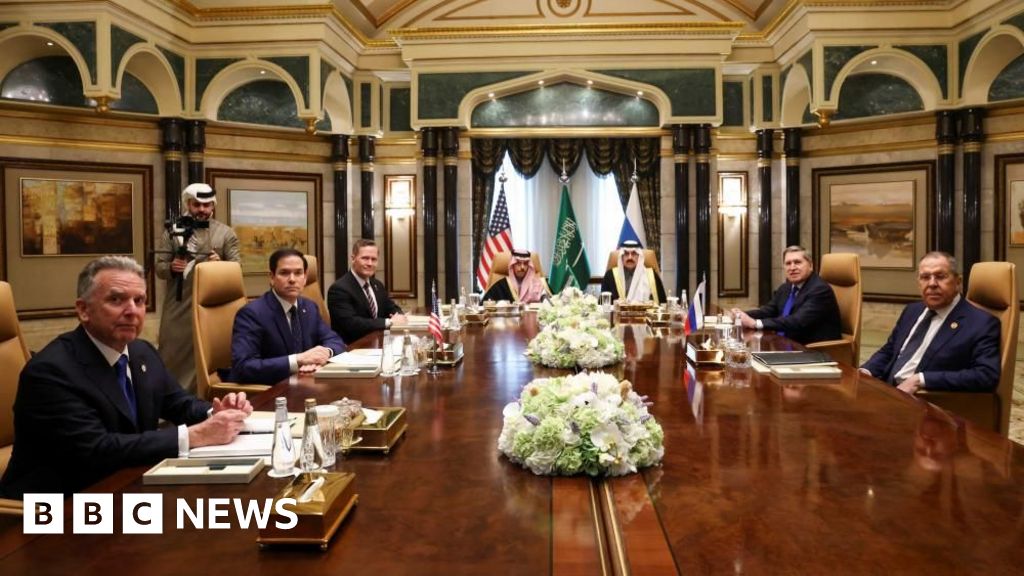Europe digital editor
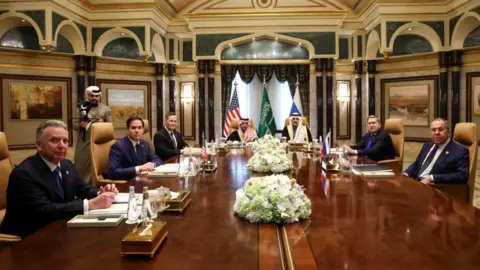 Reuters
ReutersThree Americans and two Russians made up the two teams at the talks in Saudi Arabia that have underscored an end to Western isolation of Moscow.
The men described the meeting as preparing the groundwork for broader “high-level” talks and agreed to reset their countries’ diplomatic relations.
Who are they and what significance will they play in the rapprochement between the two powers?
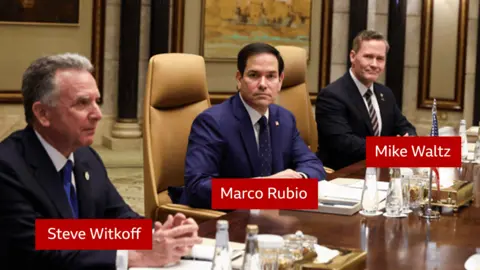 Reuters
ReutersUS Secretary of State Marco Rubio had already spoken to his veteran Russian counterpart Sergei Lavrov over the phone three days before the talks took place. He said after Tuesday’s meeting he was convinced Russia was ready for a “serious process” to end the war and the two countries would resume diplomatic relations.
Rubio has long sought an end to the war in Ukraine and voted against a $6bn US military aid package in 2024. He sees China as America’s biggest adversary and believes Beijing is happy for the US to be “bogged down in Europe”.
He has cautioned that “one meeting is not going to solve [the war]” and made clear that both Ukraine and Europe will have to be involved too: “No-one is being sidelined here.”
National Security Adviser Mike Waltz spoke after the talks of pushing for a permanent, not a temporary end to the war. But he suggested at the weekend that US deserves “some type of payback” for the billions it has paid out to Ukraine since it began.
He does not just believe that Europeans have to “own this conflict” in terms of future security guarantees. He also thinks Ukraine should share its mineral wealth in partnership with the US “in terms of their rare earths, their natural resources, and their oil and gas”.
Steve Witkoff is more of an unknown quantity. Although these were the first official talks between Russia and the US for almost two years, Witkoff was the man Donald Trump chose to send to Moscow only last week for talks with Vladimir Putin.
Ostensibly, he’s Trump’s Middle East envoy, but clearly the president’s former golf partner is far more significant than that and he is being seen as the president’s loyal and favoured dealmaker.
He was part of talks on forging Israel’s ceasefire with Hamas but was then sent to Russia to help with the exchange of US prisoner Marc Fogel for a Russian, Alexander Vinnik, in jail in America.
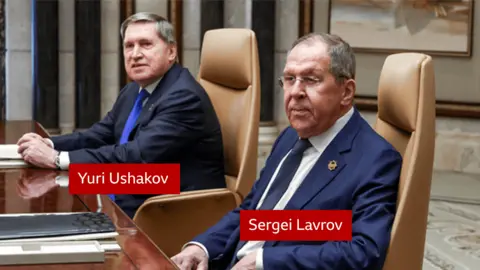 Reuters
ReutersRussia chose two top diplomats for this initial exchange of views.
Both are veterans and know the US well: Putin foreign policy adviser Yuri Ushakov and Sergei Lavrov, foreign minister since 2004.
They have helped Putin steer his foreign policy during three years of war, and it has been up to Lavrov to convey Moscow’s message.
Lavrov did it again on Tuesday. Explaining that the US delegation had proposed a halt to attacks on energy facilities, Lavrov said Russia had never targeted Ukraine’s civilian supply. A cruel denial of the truth when Russian attacks on the national grid have made power outages a common feature of Ukrainian life.
When he took part in doomed ceasefire talks with Ukraine shortly after the full-scale war began, Lavrov even denied there had been an invasion.
As former ambassador to the US, 77-year-old Yuri Ushakov has a good idea of how to talk to Washington. Within days of Donald Trump’s return to the White House he made clear Russia was ready for talks if the US sent “relevant signals”.
Days before the full-scale invasion of Ukraine, he accused the Biden administration of peak “hysteria” in suggesting Russian troops were preparing to go to war.
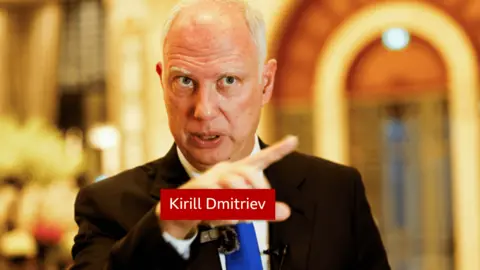
A third Russian was not in the room, but Kirill Dmitriev’s presence in the delegation is a mark of just how important Vladimir Putin sees the economic potential of the Saudi talks.
Dmitriev, 49, is head of Russia’s Direct Investment Fund and told reporters he would focus on future economic relations with the US: “We also need to make joint projects, including, for example, in the Arctic Region, and in other areas.”
Significantly, Dmitriev played a key role in working with Steve Witkoff in the prisoner exchange that preceded Trump’s phone-call with Putin last week, along with Saudi Arabia’s Mohammed bin Salman.
Dmitriev has close connections to Putin’s family – his wife is close to one of Putin’s daughters.
And few Russians know America’s finance and business sector better than Dmitriev, as a former investment banker at Goldman Sachs and a graduate of Harvard Business School.
Although he is adamant Russia’s economy is doing well, 43% of the budget is going on the war and internal security, inflation is just under 10% and interest rates have hit 21%.
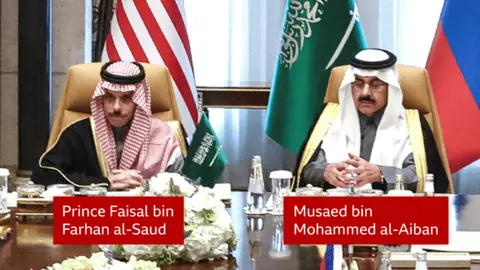
The two Saudi hosts chaired the start of the meeting but did not stay in the room.
Foreign Minister Prince Faisal bin Farhan has played an active role as top Saudi diplomat this year, visiting Lebanon and Europe and hosting an international meeting aimed at lifting sanctions on Syria.
Saudi national security adviser Musaed al-Aiban has also played a prominent part in promoting Saudi ties with Syria’s new leader Ahmed al-Sharaa.
Although Crown Prince Mohammed bin Salman takes the lead on foreign policy, these two men are regularly by his side.

